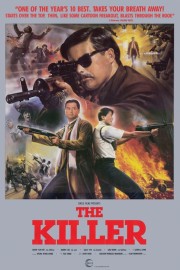The Killer
Friendship played a big role in all of John Woo’s Hong Kong films before he came to the States to director 1993’s “Hard Target.” In most of his films (“A Better Tomorrow,” “Bullet in the Head,” and “Once a Thief”), the friendships were already established before the film started. However, in his two best films from that era (“The Killer” and “Hard Boiled”), the friendships start through the course of the action, first with tense encounters, later with genuine affection towards one another. Only a couple of his American films tried to hit on this theme, but unfortunately, all the studios seemed to want out of him were slow-motion action fireworks.
In “The Killer” (which Woo also wrote), the action is driven by the dynamics between three characters: Jeffrey, the hit man played by Chow Yun-Fat, Woo’s favorite actor; Lee, a cop played by Danny Lee, who is typically in trouble with his superiors; and Jenny, a lounge singer played by Sally Yeh, whom Jeffrey partially blinded during a hit, and who he has reached out to, and cares for. Jeffrey is the center of the story, but Jenny is the heart of it, as the sympathy Jeffrey feels towards her, as well as the sense of responsibility for her being mostly blind, leads him to make decisions that, rationally, a typical hit man wouldn’t make, especially after Lee starts to reach out to her in his attempts to find Jeffrey. (As the film goes on, we see Jeffrey and Lee as two sides of the same coin, a theme made more explicit, and explored more outrageously, in Woo’s best American film, “Face/Off.”)
Though the film is fantastically entertaining, as well as hugely influential in action cinema of the past 20-something years, a pervasive sadness is evident throughout all 110 minutes of “The Killer.” The score, by Lowell Lowe, is exciting in a lot of places, but the main theme mirrors Jenny’s melancholy songs in what it brings to the story. Woo has had a remarkable gift in his best films where the violence, however over-the-top, is never glorified. Actions always have consequences, Violence is never the answer, and the sanctity of life is always put above death. This is the part of Woo’s filmmaking style most of the American filmmakers he’s inspired have all but ignored, but it’s the biggest reason why I keep returning to Woo’s Hong Kong films over and over. At his core, Woo is a romantic, who grew up loving Hollywood musicals about love, as well as westerns about honor, and fusing those two ideas into his contemporary action cinema.
That is never more true than it is in “The Killer,” and, in particular, the character of Sidney Fong (Chu Kong). Sidney is Jeffrey’s friend, as well as the person who brings him his money and targets. Through the course of the film, Jeffrey is double-crossed by a ruthless crime boss, who insists that Sidney kill Jeffrey rather than pay him. The betrayal stings for Jeffrey, but he loves his friend too much to kill him, and Sidney feels too much loyalty towards Jeffrey to just watch him die, and he helps him stay alive, as well as try and get him his money from the crime boss. Their scenes together are some of the most moving in the film, even more so than some of those between Jeffrey and Jenny, and it plays right into the notions of friendship and honor seen in westerns from everyone from John Ford to Sergio Leone and Clint Eastwood.
Nothing has the impact of the tragic conclusion of the film, though. After Jeffrey and Lee have survived a massive firefight in a church, the shooting continues outside, and Jeffrey is mortally wounded. Jenny survives, but her eyesight has deteriorated throughout the film. However, now Jeffrey (who’s been saving his money for a cornea transplant for Jenny, with his own, if need be) has been blinded, as well, and while that seems like an appropriate end for the killer, I can’t imagine anyone thinking so when Jeffrey and Jenny, who’s affection for one another is genuine, are unable to have that one, last moment so many couples are afforded in such films. It’s another moment of sadness that Woo uses to show that crime doesn’t pay, and love is, ultimately, most important in this world. Sadly, for Jeffrey, it’s too late for him to learn this lesson.










